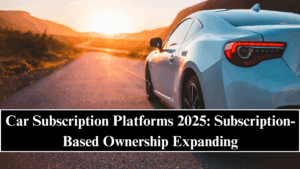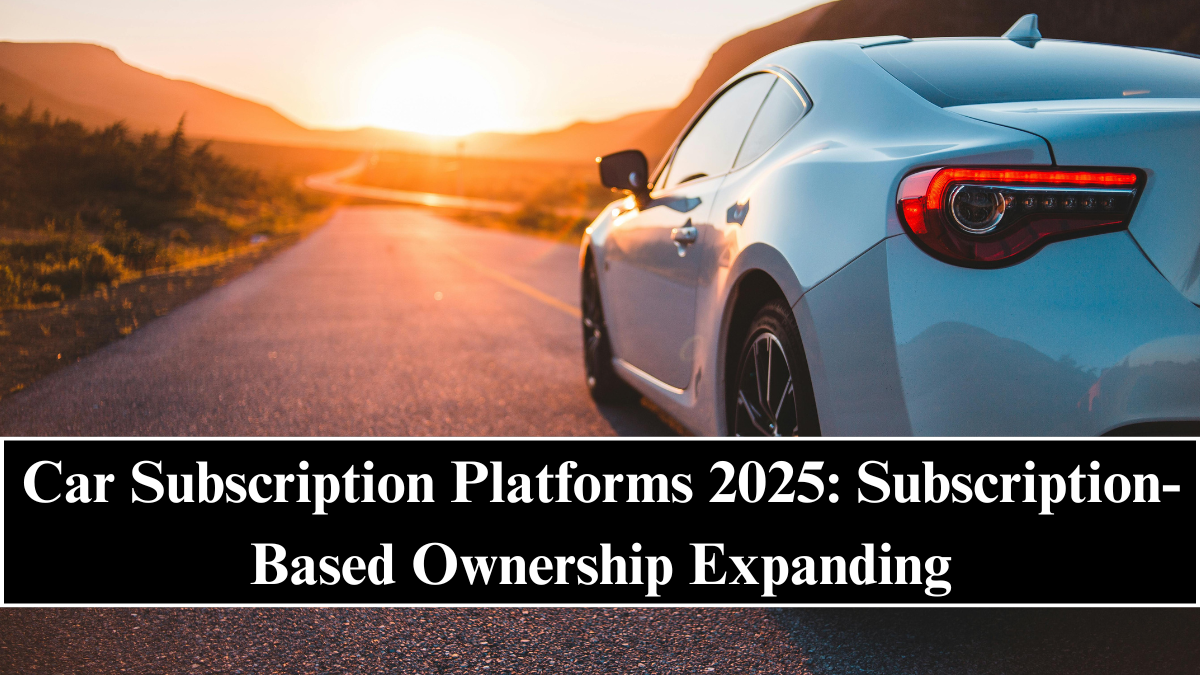In 2025, car subscription platforms are redefining how people access mobility. Instead of buying or leasing, drivers can now subscribe to vehicles like they would to Netflix or Spotify—pay monthly, swap anytime, and skip long-term commitments. This model, known as Car-as-a-Service (CaaS), is gaining massive popularity among urban consumers, professionals, and businesses looking for flexibility and simplicity.

The Rise of the Subscription Economy in Mobility
The global shift toward shared and on-demand ownership is transforming traditional automotive sales. Younger generations, particularly Millennials and Gen Z, value convenience and sustainability over long-term car ownership.
In 2025, the subscription car market is projected to surpass $30 billion globally, growing at an annual rate of 35%. Consumers now prefer “use and return” models—an ideal balance between freedom and affordability.
Popular subscription services like Care by Volvo, Hyundai Subscription, Maruti Suzuki Subscribe, and Hertz MyCar have expanded across continents, offering all-inclusive packages that cover:
-
Maintenance and insurance
-
Roadside assistance
-
Registration and taxes
-
Easy vehicle swaps or upgrades every few months
How Car Subscription Models Work
Car subscription platforms operate through digital apps and portals, allowing users to choose vehicles, customize terms, and manage everything online.
Here’s how it typically works:
-
Select a car – Choose from various models and durations (from 1 month to 2 years).
-
Pay a single fee – Covers maintenance, insurance, and registration.
-
Drive and swap – Return or upgrade when needed, no resale or loan worries.
The user-centric design gives subscribers full control without the responsibilities of ownership.
Key Market Players and Trends
By 2025, nearly every major automaker has launched its own subscription-based service:
-
Volvo’s Care by Volvo pioneered all-inclusive subscriptions in Europe and the U.S.
-
BMW Access and Audi on Demand cater to luxury customers seeking variety.
-
Toyota and Hyundai offer budget-friendly urban fleet plans in Asia.
-
Maruti Suzuki Subscribe and Tata Move dominate the Indian market with affordable, flexible EV options.
Meanwhile, startups like Kinto, FlexClub, and Cluno are expanding CaaS to smaller cities through app-based vehicle sharing platforms.
Why Consumers Are Choosing Subscription Over Ownership
-
Zero Commitment: Cancel anytime without selling hassles.
-
Affordable Access: Pay only for what you use instead of long-term loans.
-
Upgradability: Switch between models (SUV, sedan, EV) based on needs.
-
No Maintenance Stress: All services and insurance are handled by providers.
-
Eco-Friendly Choices: Encourages efficient fleet usage and reduces idle vehicles.
This convenience-driven model is particularly popular among urban dwellers, expats, and corporate professionals seeking flexible mobility solutions.
Role of Technology and AI in Subscription Platforms
AI and data analytics are powering the next generation of smart mobility subscriptions. Platforms analyze driving habits, usage frequency, and location data to offer:
-
Personalized car recommendations
-
Dynamic pricing models based on usage
-
Predictive maintenance scheduling
-
EV optimization tools for efficient charging routes
This tech-driven ecosystem ensures maximum customer satisfaction while minimizing downtime and cost inefficiencies.
The EV Subscription Boom
A major growth segment within this trend is EV subscriptions. As electric cars become mainstream, subscription services provide a low-risk entry point for users hesitant about long-term EV ownership.
In India and Europe, companies are offering battery-inclusive EV subscriptions, which handle charging infrastructure, battery swaps, and range monitoring. This model accelerates EV adoption while addressing affordability and range concerns.
The Future: Mobility Without Ownership
By the end of 2025, experts predict that 25–30% of urban vehicle users will rely on subscription models for mobility. Cities like London, Singapore, and Mumbai are integrating subscription fleets into their smart city frameworks, promoting sustainability and traffic efficiency.
The next evolution will see AI-managed multi-brand subscription platforms that combine cars, bikes, and EVs under a single mobility plan — making car ownership a choice, not a necessity.
FAQs
What is a car subscription platform?
It’s a service that lets you pay a monthly fee to use a car without buying or leasing it. The cost usually covers insurance, maintenance, and taxes.
How is a subscription different from leasing?
Leasing locks you in for years, while subscription models offer short-term, flexible use with the option to switch or cancel anytime.
Which brands offer car subscription services in 2025?
Volvo, Hyundai, Toyota, BMW, Tata, and Maruti Suzuki all offer car subscription plans globally.
Are EVs included in subscription plans?
Yes. Most providers now include electric vehicles with options for home charging, battery swaps, or public charging access.
Is subscribing cheaper than owning a car?
For short- to medium-term users, yes. Subscriptions eliminate loan EMIs, insurance renewals, and resale worries, making them cost-effective and hassle-free.
Click here to know more.
